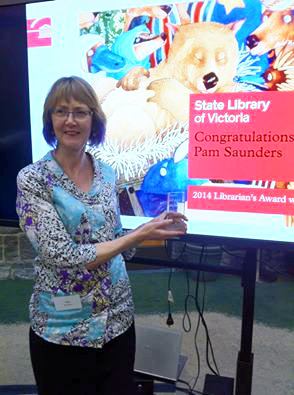
During 2014, School Library Assoc of Victoria has presented a full calendar of professional learning. This post reflects on the conference School Library Roles: a Process of change held on 31 October at the Catholic Leadership Centre, East Melbourne. The gathering of over 120 delegates reflected on the impact that change has in school library staff job descriptions, tasks and responsibilities and how it is to be managed.
Head of Library at Whitefriars Catholic College, Rhonda Powling, laid out the tone of the conference in her opening keynote. Karen Malbon provides a thoughtful reflection on the presentation in her blog Infinite Possibilities where she says:
So often we hear gloom and doom stories about school libraries. Rhonda is optimistic for the future and drew our attention to the futuristic thinking of Mark Pesce and the 2013 ALIA discussion paper, Library and Information Services: the future of the profession themes and scenarios 2025.The three themes identified were convergence, connection and the golden age of information. Convergence generally means fewer jobs but require skills, connection is a library strength and the golden age of information is full of possibilities for libraries.Libraries will flourish with professional expertise, connectedness, by building relationships with the community and by empowering clients. It is time to let go and move on. School library staff need to be open to challenges, creative, team based, collaborative and focused on the needs of community……. Read all of Karen’s reflection…
One of the aims of the day was to provide the conditions for delegates to discuss the variations between the roles of library staff and the impact on library team members’ situations. Personal input and discussion, followed by presentations from a panel of library staff who spoke positively about their jobs and the students they encounter daily was encouragement for everyone to go back to school and look closely at their roles and the documentation supporting it. Resources to support an analysis of roles and preparation for an annual review meeting can be found here.
There’s an increased emphasis at SLAV conferences to allow delegates time to try out new skills, discuss what works and simply swap ideas. The ‘sand pit’ session facilitated by Glenda Morris, teacher librarian, was hands-on time covering a range of topics from web tools to makerspaces and search engines. Comments from these sessions and more covered in the conference are captured in the Storify below.
SLAV conferences are increasingly about raising issues and building knowledge through the community. School libraries are being challenged, as Rhonda pointed out in her keynote, yet the future is potentially very bright. It does, however, require rethinking, reskilling and a good understanding of your role.



